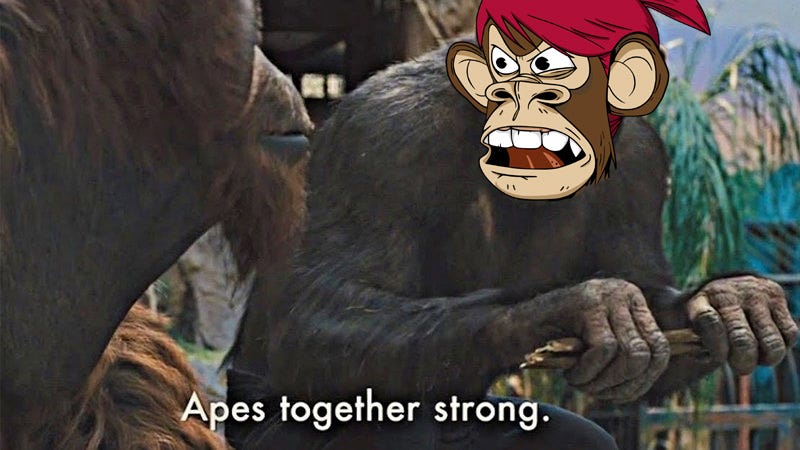More Monkey Business With Music NFTs
Competing Apes Could Spell Trouble For Major Label Crypto Plans
Last week, Universal Music Group announced the signing of the world’s first NFT group, Kingship, comprised of four characters from the culturally-frothy Bored Ape Yacht Club NFT collection. At the time, this seemed like the obvious next stage of the NFT-mania that’s taken large swaths of the music industry by storm in 2021. And Twitter was quick to point out the similarities between this new group and previous simian-themed artificial pop projects, from The Monkees to Gorillaz.
Then today, something surprising did happen. A second ape-adjacent music project, Ape-In Productions (AIP), was announced. Helmed by Timbaland, who produced the first track, “Goin' Ape Shit," the AIP shrewdness (that what you call a group of apes) responsible for AIP includes Versuz co-founder Gary Marella, cannabis entrepreneur Clement Kwan, and Andrew Rosener and Jonathan Tenenbaum of MediaOptions, a company that makes its money “acquiring and selling high-value domain names”
One item the press release failed to mention is who exactly is rapping on the track, credited to TheZoo, which could first be heard yesterday on the API website. The site is also where 3,000 tokens could be minted by fans at a cost of 0.25E (about $1,043 USD) each, although fewer than 1,000 appear to have been actually made with less than 3-hours left in the 24-hour minting window.

Another question is, obviously, how is something like this even allowed?
The answer lies somewhere in the decentralized ethos of the original BAYC creators Yung Labs, which grants monetization rights to whoever owns a particular ape. This apparently means that the apes are free agents, allowing some to sign a deal with UMG, while others could become part of AIP. There’s even an ape named Jenkins that is represented by Creative Artist Agency and has a novel coming out soon (seriously).
On one hand, this isn’t that different from one band of indie rock dudes signing to Matador Records while a different group of indie rock dudes sign to Merge. Or the fact that a Homosapien named George Clooney is, like Jenkins, repped by CAA, while another Homosapien named Joshua Glazer does not have any professional talent representation at all.
On the other hand, it’s not the same thing at all. Only time will tell how much appetite the public has for media produced by anthropoid avatars. It could be fleeting. It could be limitless. We’ll probably have the answer sooner than later.
Yet another currently unanswered question is how the larger music industry and its army of copyright lawyers will enter the metaverse. After all, if API is, as is claimed in its Twitter bio, “The first Ape-owned major label of the metaverse,” then can the law firm of Lionel Hutz and Harvey Birdman be far behind?
So far, the music industry seems determined not to make the same mistakes with NFTs that it did in response to Napster two decades ago. This play-nice attitude is refreshing compared to the scorched earth approach of the early 2000s, but it could quickly change if too many folks inside the majors start to feel screwed over by the open-source spirit of Web3.
Individuals and IP are not the same, no matter how many degens (crypto slang for degenerate gamblers) wish it so. Only one has actual agency (and agents).
Want to collaborate with The Cadence? Contact us.
TAKEAWAYS
Salient statements from this week’s music news.
1. Republic Records Sues Fintech Firm Republic After NFTs Launch
Getting along with Web3 doesn’t mean tossing out trademark protection.
Takeaway: It’s the recent expansion into music NFTs that has led to the clash with Republic Records. Not least because, as the latter’s legal complaint makes clear, it has its own plans to explore NFTs.
2. Grimes Forms New AI Girl Group NPC
Grimes and producer Chris Lake’s attempt at artificially generated pop music sounds a whole lot like everything else.
Takeaway: “NPC will eventually be playable, customizable, and able to cater to each individual listener’s unique desires. Decentralized Popstardom. Made, not Born.”

3. Universal Music Finalizes ‘Strategic Initiative’ With Brand-Management Company Authentic Brands Group
With catalog revenue soaring, artists and estates are looking for new ways to make money off old music.
Takeaway: The union will focus chiefly on preserving “the legacies of history’s greatest artists” as opposed to promoting contemporary creators.







